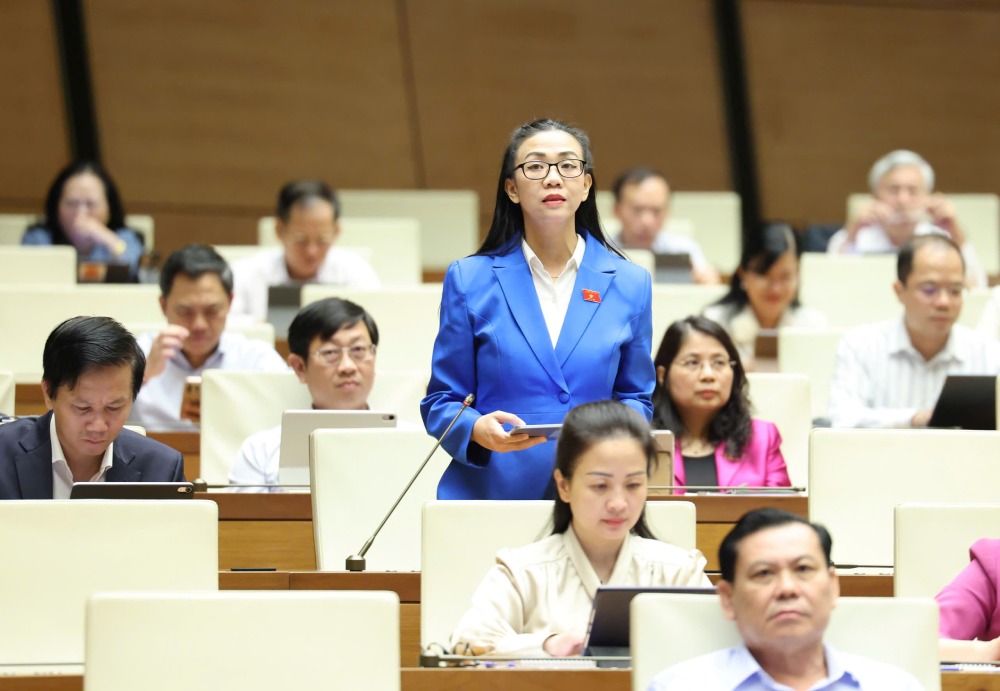On the afternoon of November 13, discussing the draft Law on E-commerce, delegate Huynh Thi Phuc (HCMC delegation) said that through experience on social networking sites, it showed that an entire "e-commerce market" was operating amid livestream lights.
"People sell without saying they sell, advertise without admitting to advertising. A dress, a bottle of ice cream, a drinking bottle, just a few meaningless sentences that thousands of people have come to like, share, comment and buy. There is even a virtual army and then there are links to buy goods, discount codes, and account numbers, the delegate shared.
The female delegate pointed out that behind the seemingly harmless videos is an uncontrolled, un accredited trading system and no one is responsible.
The delegate cited a number of cases related to KOLs and KOCs in many ways to attract interaction that have been entangled in the legal loop in recent times, while customers were surprised by their trust in sellers of counterfeit, fake goods, and advertisements for functional foods as medicine.
New tricks on the internet have surpassed the 4 groups of behaviors mentioned in the draft law, because they do not commit fraud in traditional sense, nor do they do business in counterfeit goods on official exchanges, but take advantage of their influence and reputation, even using offensive image elements to sell goods, to make money from shares, views and purchases.
More dangerously, this is not just a story of ethics but a form of manipulation of consumer behavior, exploiting public trust psychology.
The viewer believes in people rather than products, believes in ethics rather than labels, believes in actors and influencers such as KOLs, KOCs, TikToker rather than inspection stamps.
And when trust becomes a commodity, the law must intervene because it is no longer only a social impact but also affects commercialization, delegate Huynh Thi Phuc emphasized.
The delegate proposed to add to the draft law: Prohibit taking advantage of image, reputation, prestige, social influence and offensive, provoking, and unconventional behavior to promote, invite, sell, provide services, and disseminate disguised e-commerce content to handle cases of sales that are not sales, preventing the situation of turning commercial activities into sight-catching entertainment activities.
The delegate of Ho Chi Minh City proposed to add the responsibility of the managers of social networks operating e-commerce such as TikTok, Facebook, YouTube in the draft law, warn, and remove content with disguised, sexy or offensive commercial elements.
Especially when livestreamers have a large number of followers or the audience is teenagers, it is impossible to let thuatms prioritize offensive dance videos because they create many interactions, while this is the "door" to push poor quality products to the market and directly affect consumers.

Delegate Trinh Thi Tu Anh (Lam Dong delegation) proposed adding the responsibility of protecting children in e-commerce.
Delegates cited statistics from UNICEF Vietnam 2025, Vietnam E-commerce Association, every day, 70% of children under 15 years old receive personalized advertisements: toys, games, fast food, continuously, without stopping; 45% of children aged 13 to 17 spend more than 500,000 VND per month on e-commerce platforms, and 65% of them are due to algorithm suggestions.
The delegate suggested that advertising based on personal data, behavior or location of users under the prescribed age should be completely banned.
Children's accounts must be defaulted to private mode and must provide a feature that allows children and parents to choose to display in real time, not personalized by algorithms.











